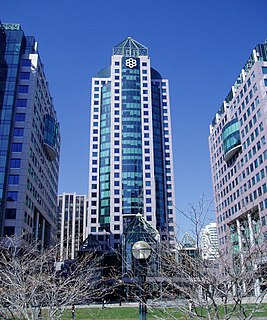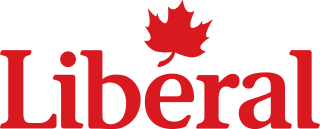
The Toronto City Council is the governing body of the City of Toronto in Ontario, Canada. Members represent wards throughout the city, and are known as councillors. The passage of provincial legislation in the summer of 2018 established that the number of wards be reduced from 44 to 25 and that they be based upon the city's federal electoral districts as of the year 2000. While the federal districts have been redistributed since then, the ward boundaries remain the same. The city council had at its peak 45 members: 44 ward councillors plus the mayor. On September 19, 2018 an Ontario Court of appeals granted a stay order of a previous court decision that would have prevented this reduction, thus re-establishing the move to 25 wards. The actual court appeal of Bill 5 has yet to be scheduled, but was heard subsequent to the municipal election on October 22, 2018.
Alan Tonks is a former Canadian politician. He was the Liberal MP for the federal riding of York South—Weston in Toronto from 2000 to 2011, and was the final Metro Toronto Chairman before the amalgamation of Metro Toronto into the new City of Toronto.

The Toronto municipal election of 2000, dubbed "Toronto Vote 2000" was the municipal and school board election held in the City of Toronto, Ontario, Canada on November 13, 2000.
The 1991 Toronto municipal election was held on November 12, 1991 to elect councillors in Metropolitan Toronto, Ontario, Canada, and mayors, councillors and school trustees in Toronto, York, East York, North York, Scarborough and Etobicoke.
The 1985 Toronto municipal election was held to elect members of municipal councils, school boards, and hydro commissions in the six municipalities that made up Metropolitan Toronto, Ontario, Canada. The election was held on November 12, 1985.
The 1988 Toronto municipal election was held to elect members of municipal councils, school boards, and hydro commissions in the six municipalities that made up Metropolitan Toronto, Ontario, Canada. The election was held November 14, 1988. This election also marked the abolition of Boards of Control in North York, Etobicoke, Scarborough, and York. The Toronto Board of Control had been abolished in 1969.
The Toronto municipal election of 1976 was held on December 6, 1976 in Metropolitan Toronto, Ontario, Canada. Mayors, city councillors and school board trustees were elected in the municipalities of Toronto, York, East York, North York, Etobicoke and Scarborough.
The 1982 Toronto municipal election was held on November 8, 1982, in Metropolitan Toronto, Ontario, Canada. Mayors, controllers, city councillors and school board trustees were elected in the municipalities of Toronto, York, East York, North York, Etobicoke and Scarborough.
The 1980 Toronto municipal election was held on November 10, 1980 in Metropolitan Toronto, Ontario, Canada. Mayors, controllers, city councillors and school board trustees were elected in the municipalities of Toronto, York, East York, North York, Etobicoke and Scarborough.
The 1974 Toronto municipal election was held on December 2, 1974 in Metropolitan Toronto, Ontario, Canada. Mayors, controllers, city councillors and school board trustees were elected in the municipalities of Toronto, York, East York, North York, Etobicoke and Scarborough.
Municipal elections were held in Toronto, Ontario, Canada, on December 1, 1969. Across Metro Toronto there were few surprising results, and city of Toronto incumbent mayor William Dennison was easily re-elected. The one dramatic exception to this was on Toronto city council, where a number of long-standing members lost to young new arrivals who shared a common vision of opposition to the megaprojects that had transformed Toronto throughout the post-war period. While the reform movement candidate for mayor lost, it gained a strong presence on city council. The 1970s reform faction dominated Toronto politics for the next decade.
The 1972 Toronto municipal election was held December 4, 1972, to elect the governments of Toronto, Ontario, Canada, the five other boroughs, and the government of Metro Toronto as well.

Maureen Prinsloo was a municipal politician in Scarborough, Ontario who served as Chair of the Toronto Police Services Board from 1995-98.
Municipal elections were held in Toronto, Ontario, Canada, on December 5, 1966. The elections were the first for Toronto after its merger with several smaller suburban communities on January 1, 1967. Forest Hill and Swansea were annexed by the City of Toronto, Leaside was merged with the Township of East York to become the Borough of East York. Weston was combined with the Township of York to form the Borough of York. The Village of Long Branch and the towns of Mimico and New Toronto were merged with the Township of Etobicoke to form the Borough of Etobicoke.
Municipal elections were held in Toronto, Ontario, Canada, on December 7, 1964. Incumbent mayor Philip Givens defeated former mayor Allan Lamport.
Municipal elections were held in Toronto, Ontario, Canada, on December 3, 1962. Incumbent mayor Nathan Phillips, then the longest-serving mayor in Toronto history, lost to Controller Donald Summerville by a significant margin.
Municipal elections were held in Toronto, Ontario, Canada, on December 1, 1958. Four year incumbent mayor Nathan Phillips won reelection against Controller Ford Brand, who was supported by the Co-operative Commonwealth Federation and Toronto Labour Council, and Controller Joseph Cornish.
Municipal elections were held in Toronto, Ontario, Canada, on December 7, 1953. Incumbent mayor Allan Lamport won an unexpectedly close race against school board trustee Arthur Young. This election was the first for councils in the municipality of Metropolitan Toronto which would be created on January 1, 1954 and was composed of 14 municipalities: the City of Toronto, the towns of New Toronto, Mimico, Weston and Leaside; the villages of Long Branch, Swansea and Forest Hill, and the townships of Etobicoke, York, North York, East York, and Scarborough.

The municipal election was held on October 25, 2010 to elect a mayor and 44 city councillors in Toronto, Ontario, Canada. In addition, school trustees were elected to the Toronto District School Board, Toronto Catholic District School Board, Conseil scolaire de district du Centre-Sud-Ouest and Conseil scolaire de district catholique Centre-Sud. The election was held in conjunction with those held in other municipalities in the province of Ontario. Candidate registration opened on January 4, 2010 and ended on September 10. Advance polls were open October 5, 6, 7, 8 and 12, 13, 16 and 17.


















